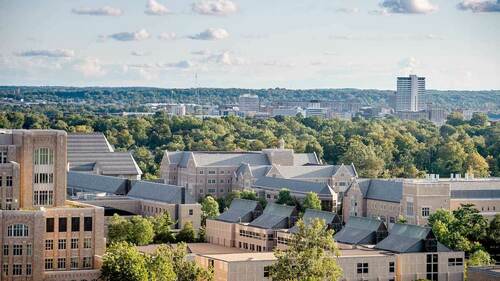
The University of Notre Dame is partnering with the city of South Bend to transform raw, underused data into useful information that can be used to shape policy and improve city government, saving taxpayer time and money.
As part of an effort led by the University’s new online master’s degree program in applied and computational mathematics and statistics data science, Notre Dame students will work with the city of South Bend’s Department of Innovation and Technology, led by Chief Innovation Officer Santiago Garces, a Notre Dame alumnus, to analyze public data in an effort to improve government operations.
Sonia Howell, Notre Dame’s online M.S. in data science program producer, recently met with city officials, including Garces, and representatives of various departments across campus, including Applied and Computational Mathematics and Statistics, Computer Science and Engineering, Sociology and the Mendoza College of Business, to hash out the details of the partnership.
The group discussed ideas for projects using existing sources of raw data, from U.S. Census Bureau statistics to the city’s own open data portal, an online repository of demographic, payroll, code enforcement, financial and other public data in various forms.
Highlights included:
• The cross-referencing of 311 customer service data to better process and respond to customer service calls.
• The use of street, traffic and 311 data to optimize street paving and minimize maintenance costs associated with pothole repair.
• The use of housing and other data to develop a risk model for code enforcement that identifies potential substandard housing conditions for inspection.
With code enforcement, the idea would be to “create a model that predicts what properties are at risk and target proactive interventions to those properties,” Garces said, similar to the way New Orleans uses housing data to identify those properties most at risk for residential fires that could lead to death.
“We’re creating a risk score and ranking different parts of the city, so we know what areas ought to be looked at a little more closely,” Garces said.
The city established an open data portal — the first of its kind for a public agency in the state — in 2013 in an effort to increase transparency, spur innovation and find practical ways to improve life for residents.
A member of the Harvard-based Civic Analytics Network, it frequently analyzes the information itself, Garces said, and with external partners, including the University of Chicago and enFocus, a nonprofit innovation organization with ties to the University of Notre Dame.
But with limited resources, it has yet to fully analyze the information, he said, a time-consuming task that involves processing, cleaning, exploring, modeling, applying and reporting the data.
Enter Notre Dame.
This latest effort represents the next step in a relationship that started in 2015 when the University, in partnership with the city, joined the MetroLab Network, a national consortium of university-city partnerships committed to developing ways to improve infrastructure, city services and other public sector priorities through the use of technology and data science.
More recently, Hadley Wickham, chief scientist at RStudio and an adjunct professor of statistics at the University of Auckland, Stanford University and Rice University, delivered a talk and completed a “data science challenge” here in conjunction with the launch of the data science program.
“This was kind of an experiment, a brainstorm — which was fun for me to do — and I hoped that that data science students were going to get something out of it,” Wickham said.
The challenge hinged on a specific question: Could the city develop a risk model for code enforcement using only existing data?
The answer, for various reasons, was no, but “in collaborating with the city around the Wickham challenge, we became aware of how much data they have and the limited resources they have for working on it,” said Roger Woodard, director of the online data science master’s degree program.
And with departments across the University increasingly focused on data science, Woodard said, “partnering with the city around data science problems offers a great opportunity for both the University and the city.”
“This partnership gives our students a unique opportunity to work on real-world data and real-world challenges while also contributing to the University’s commitment to enhancing the South Bend area,” Woodard said. “It also opens up great internship opportunities that afford students that critical industry experience.”
The city, meanwhile, is able to take greater advantage of the information on hand to develop practical solutions to sticky problems and, at the same time, identify holes or inconsistencies in the data.
“A lot of times you don’t know about data maintenance issues until you start to analyze it,” Garces said.
The partnership also provides opportunities for students and faculty to engage with the community in a broader way, forging strong working relationships with residents and city officials alike.
“Intrinsically, it’s good for people to spend some time in the community, to get to know the city better,” Garces said. “When you help someone out, you feel closer to them.”